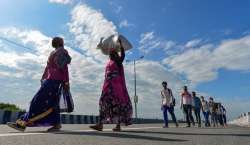Will die of hunger before any disease, say migrant workers amid coronavirus lockdown
For these workers, the stress of lockdown has overtaken the fear of the disease so much so that they are not taking preventive measures like maintaining social distancing, wearing masks and washing hands regularly to protect themselves from possible infection.

"We will die of hunger before any disease if we stay here. There is no one to even take care of our cremation," says migrant worker Savitri, who set on foot for her home in Uttar Pradesh's Kannauj district amid the coronavirus lockdown even though her destination is over 400 km away. Savitri (30), who lived in a slum in Rajouri Garden area, had no option but to undertake the arduous trek as the nationwide lockdown due to COVID-19 pandemic left her jobless and with no means to arrange food for her two small children. "People are talking about the danger of some virus which can kill all of us. I don't understand all these. As a mother, I am pained when I cannot feed my children. No one is there to help. All are equally worried about their lives," Savitri told PTI as she walked along the Mathura Highway Road carrying her belongings on her head.
She is among lakhs of migrant labourers who have only one goal ahead: reach their villages at the earliest, come what may. Though the Delhi and Uttar Pradesh governments have arranged buses to ferry those stranded, many have chosen to walk along. The few buses which were arranged were completely crammed with many people sitting atop them too. The panicked workers are rushing to their native places even thought shelters are being set up for them in the national capital to stop the mass exodus.
For these workers, the stress of lockdown has overtaken the fear of the disease so much so that they are not taking preventive measures like maintaining social distancing, wearing masks and washing hands regularly to protect themselves from possible infection. Ashok (25), a construction labourer living in Ismailpur near Badarpur border, has a backpack with bare essential items and is bound for his hometown in Hardoi district. He has his identity card ready in case police stop him on the way. Asked when he expects to reach home, he said, "I don't know, but I have no other choice. I cannot die here alone. I am jobless and don't have savings to sustain. Better I go home and do farming. If I am lucky, I will survive."
Mahesh, another daily wager working with the Public Works Department (PWD), is determined to go back with his family and relatives to their native village in Jhansi district and has began their 440-km-long journey on foot. After walking several kilometres, they received some food packets being distributed on the highway, the first meal they managed to get for the day.